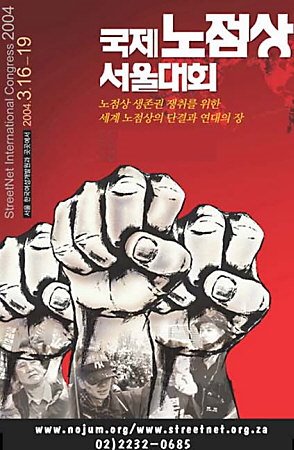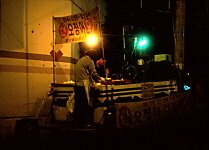(Small businesses) The progressiveness of street vendors
 Visited the internet site of the monthly Mal after a long time. They had a notice of an international conference of street peddlers (nojômsang) in Seoul on March 15-19. Visited the internet site of the monthly Mal after a long time. They had a notice of an international conference of street peddlers (nojômsang) in Seoul on March 15-19. Then, while taking a look at Hanchongnyeon's website to see if there's been anything going on regarding Hwang Jang-yop, who has received a death threat a few days ago, I also saw a notice of the same conference, which has hardly been mentioned elsewhere, Hankyoreh and Ohmynews included. The organizers are the National Federation of Street Vendors of Korea (Chôn'guk nojômsang yônhap) and Streetnet, an international organization of street vendors. So what is it in street vendors that the so-called progressives find worth siding with? Their alleged resistance to the bourgeois society? Vendors as the downtrodden to be defended? The importance of their alliance in the progressive cause, whatever that would be? (Look at the poster.) There is clearly some sort of idealized thinking about these vendors, in which the vendors' low-status and unfavorable position vis-a-vis state policies and their organization of themselves make the vendors progressive in their view. (Look at the banner in the vendor federation's homepage.) Street vendors do have been in a disadvantageous position sure, but my "comparative impression" of the Korean scene is that regarding the formally illegal status of street vending in Korea, its position is not bad at all. In fact much of the "informality" of peddling has taken "formal" characteristics even though outside the governmental formality. This includes for example the selling and buying of vending lots in good business sites. With stories of meddling of gangsters in this, the general view on vending is not necessarily positive, and I got the impression that Cheonggyecheon vendors' struggle against their removal did receive much support.  I find it remarkable though that Korean street vendors are willing to enter into international unions like this; 일단 못사는 나라들하고 놀아주는 건 적극적으로 평가해야지. I find it remarkable though that Korean street vendors are willing to enter into international unions like this; 일단 못사는 나라들하고 놀아주는 건 적극적으로 평가해야지.What about the Marxist view on the informal sector, that it actually contributes to the accumulation of capital by the capitalists by providing goods and services at low prices and thus helping to keep wages low? (Here's an article of the opening of a new second-hand market in the Tongdaemun stadium for the removed Cheonggyecheon vendors.) Categories at del.icio.us/hunjang: businesskeepers ∙ stratification |


